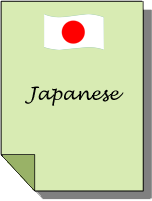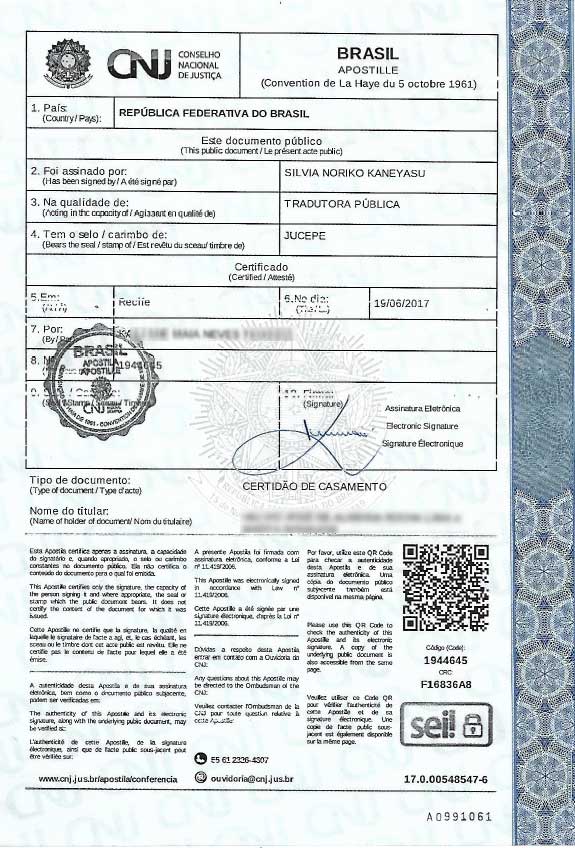
Sworn translation gives legal validity to foreign documents in Brazil.
 What is Sworn Translation?
What is Sworn Translation?
Sworn translation is the translation done by a qualified professional, known as public translator or sworn translator, approved in a public certifying exam and duly registered at the commercial registry of the state in which he/she lives.
Brazilian law establishes that for a foreign document to be effective in Brazil it must be translated into Portuguese by a certified sworn translator.
The sworn translator system is managed by the commercial registry of each state, which carries out certification exams in several languages on an irregular basis.
I am a certified sworn translator who passed the exam implemented in 2011 by the Commercial Registry of the State of Pernambuco (JUCEPE) for Japanese language, where I am duly registered.
Examples of documents requiring sworn translation include passport, resident card, family register, birth/marriage/death certificate, divorce notification, driver’s license, certificate of criminal record, school documents such as graduation certificate, certificate of completion, academic transcript, etc., and legal documents such as minutes of meeting, contract, letter of attorney, case file, will, judicial sentence, letter rogatory, etc., but any writing in a foreign language that has to produce legal effect may be subject to sworn translation.
Sworn translations are usually required for foreign documents to be submitted to public agencies, government agencies, courts, banks and educational institutions, such as schools and universities.
As a sworn translator registered at the Commercial Registry of the State of Pernambuco (JUCEPE), invested with 'public faith’ (official validity) throughout the national territory, I am qualified to carry out sworn translation between Portuguese and Japanese, which I do paying particular attention to its accuracy and faithfulness so as to give the document due legal effect.
 |
For confirmation (in Portuguese), please acess: www.jucepe.pe.gov.br/ |
 Handling Languages:
Handling Languages:
I am qualified to perform sworn translation between JAPANESE and PORTUGUESE.
 |
 |
 How much does it cost?
How much does it cost?
Sworn translation fees are established according to the type of document to be translated and whether it is from Japanese do Portuguese or from Portuguese to Japanese.
|
COMMON TEXTS Passports, civil registration certificates, identity cards, professional qualification cards and similar documents, including personal letters not involving legal, technical or scientific texts. From Japanese to Portuguese: BRL 74.26/lauda* From Portuguese to Japanese: BRL 92.06/lauda* |
|
SPECIAL TEXT Legal, technical, scientific, commercial, including banking and accounting, school certificates and diplomas. From Japanese to Portuguese: BRL 103.95/lauda* From Portuguese to Japanese: BRL 127.72/lauda* |
| * | One 'lauda' is defined as a set of 1000 (one thousand) characters, spaces not included. |
Notes:
|
|
ATTENTION! In sworn translation the number of characters considers the final translation and not the original text. Thus, the exact amount will only be known when the translation is ready. Based on the document presented, I estimate how many characters the translation will result, thus there may be a difference for more or less in the final value. |
 How to request Sworn Translation?
How to request Sworn Translation?
First, send me the material to be translated by email, Skype or WhatsApp and I will be happy to offer you a quote.
Quote is provided for free!
|
Once the quote is approved, I will request the payment of 50% in advance. The remainder will be due at the conclusion of the service.
At the same time, send or deliver the original or certified copy of the document to be translated. It is to confirm the authenticy of the document and I will return it to you along with the translation.
When the translation is ready, I will send you the invoice with the balance due based on the actual number of characters in the translation.
If you want the translation to be sent by mail, please inform your ZIP code (or country name, if international) so that I can tell you the additional shipping cost.
Once payment is confirmed, the translation will be delivered or sent to you.
 Payment methods
Payment methods
For customers within Brazil, accepted payment method is bank transfer (Banco do Brasil).
For international customers, accepted payment method is by PayPal.
 Cancellation Policy
Cancellation Policy
Service cancellation after the placement of the order is subject to a cancellation fee of 10% of quote amount as compensation for the time invested in research and preliminary documentation.
If the translation has already started, in addition to the cancellation fee, the value corresponding to the translation already executed so far will be charged.
.
 VALIDITY OF SWORN TRANSLATION
VALIDITY OF SWORN TRANSLATION
Although sworn translators are registered in the Commercial Registry of certain state, their sworn translations are valid throughout the national territory and also abroad, in countries with which Brazil has celebrated diplomatic and documentary reciprocity agreement.
⇒ Signature Notarization:
Decree 13,609 of October 21, 1943, which provides on the role of Public Translator, establishes that sworn translators are invested with 'public faith’ (official validity) and, in this sense, a priori, notarization of the translator's signature by a public notary is not necessary.
However, some organizations may require notarized signature of the translator, especially when it comes to organizations located in the countryside or in other states.
So, to avoid setbacks, I recommend that my signature on sworn translations be notarized by a public notary.
My signature can be notarized by resemblance at the 1st, 3rd, 6th, 8th and 12th public notary in Recife and at the 1st, 2nd and 3rd public notary in Brasilia.
Upon request and payment of a fee, I can request the notarization of my signature at the notary office on your behalf.
 APOSTILLE
APOSTILLE
The Hague Convention Abolishing the Requirement for Legalization of Foreign Public Documents, known as the Hague Apostille Convention, aims to streamline and simplify the legalization of documents between signatory countries.
Among the countries that have ratified the Hague Apostille Convention are Japan and, since 2015, Brazil.
As a result, since August 2016, when the convention entered into force in Brazil, public documents issued in signatory countries are recognized in Brazil and vice-versa with the mere issuance of an Apostille, that is, if they bring a certificate issued under the Hague Convention, authenticating the origin of the public document.
Thus, in order for public documents issued in Japan to be recognized in Brazil, they must have an Apostille issued by the Ministry of Foreign Affairs of Japan before being translated into Portuguese, since the apostille must be mentioned in the sworn translation.
In Brazil, the body in charge of coordinating and regulating the application of the Hague Apostille Convention is the CNJ (National Council of Justice), which granted the notary offices the attribution of placing the Apostille on Brazilian public documents to be valid abroad. (However, the notary offices that can issue an Apostille are limited to those where the signer of such public document has registered his/her signature.)
In addition to the issuance of an Apostille for the public document itself, some institutions may require an Apostille also for its sworn translation, because it is also a public document. Whether it will be required or not, please contact the institution where the document is to be submitted.
If necessary, an Apostille for my sworn translations may be issued at the 1st, 3rd, 6th, 8th and 12th public notary in Recife and 1st, 2nd and 3rd public notary in Brasilia, where I have my signature registered. [See model at right]
Upon request and payment of a fee, I can request the issuance of an Apostille for my sworn translation at the notary office on your behalf.
 |
For details (in Portuguese), please access: www.cnj.jus.br/ |








